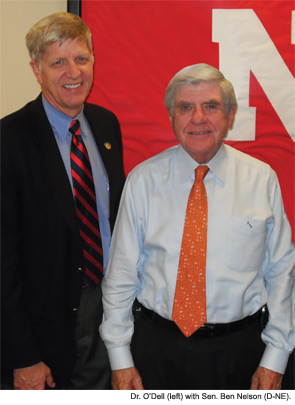

Anyone who knows me is aware of my great passion for the Nebraska Cornhuskers football team. I begin each season with unadulterated hope and excitement, confident that the team can go all the way to the national championships. The end of the season can be anticlimactic, as it was last year where we ended up 9 and 4 with no championship title. But 2012 brings a new season for the Huskers, a second go-round in a new conference with a fresh chance at victory, and I am hopeful, as ever, that this might be our best year this century. Such is the never-ending cycle of a sports fan. I tell you this because I find many similarities between the highs and lows of following your favorite sports team and the saga of policy making on Capitol Hill.
Advocating for Rheumatology
For the past decade, I have made a number of trips annually to Washington, D.C., to take part in an essential element to advancing our profession: advocacy. After years of meeting with staffers and lawmakers on Capitol Hill, I can clearly see the progress we are making and the relationships that we are building, and understand why it is so imperative that the ACR remain focused on developing our advocacy team.
Lately, when I enter the offices of my Senators or my Congressman, I am often greeted on a first-name basis. This is because, like many of you, I have invested in the development of these relationships by visiting with my lawmakers both in D.C. and at home, offering my assistance on issues and letting them know where rheumatology stands on health policies. There are many advantages to these relationships.
Like so many things in life, it really is all about personal connections. Recently, we at the Omaha VA had a major issue with a new national research policy that could have been detrimental to veterans and resulted in research being halted. A call to a contact in one of my senators’ offices promptly resulted in this policy being overturned. It was because of the personal relationship I had with my senator and this particular staffer that we were successful in stopping a bad policy from being implemented.
When I started visiting Capitol Hill with the ACR years ago, it was inevitable to get a blank stare and that dreaded question, “So, what is a rheumatologist?” I would spend half of my meeting talking about my training and the myriad conditions rheumatologists manage. The ACR recognized this problem and ramped up its advocacy efforts over the years. The ACR’s annual fly-in, Advocates for Arthritis, has gone from 36 attendees in 2006 to more than 120 rheumatologists, health professionals, and patients visiting 200 congressional offices in 2011. We’ve increased the frequency with which we visit Capitol Hill, giving rheumatologists the opportunity to build relationships with lawmakers and their staff. The ACR’s public relations campaign, Simple Tasks, is also building greater awareness of rheumatology on Capitol Hill and beyond.
RheumPAC Six Years Old and Growing
Another tool the ACR has used to put rheumatology on Congress’ radar is our political action committee. In the last five years, I’ve personally seen the doors that are opened to us through RheumPAC. I had the opportunity to deliver a RheumPAC contribution to Rep. Lee Terry (R-NE). I met him at a local restaurant and chatted with him for 45 minutes about rheumatology, our concerns with the Independent Payment Advisory Board (IPAB), issues with the Physician Quality Reporting System, reimbursement, and research funding. This one-on-one interaction is invaluable and has resulted in a much greater recognition of rheumatology and our issues. Rep. Terry now calls me by name and understands more about the important things we do.
